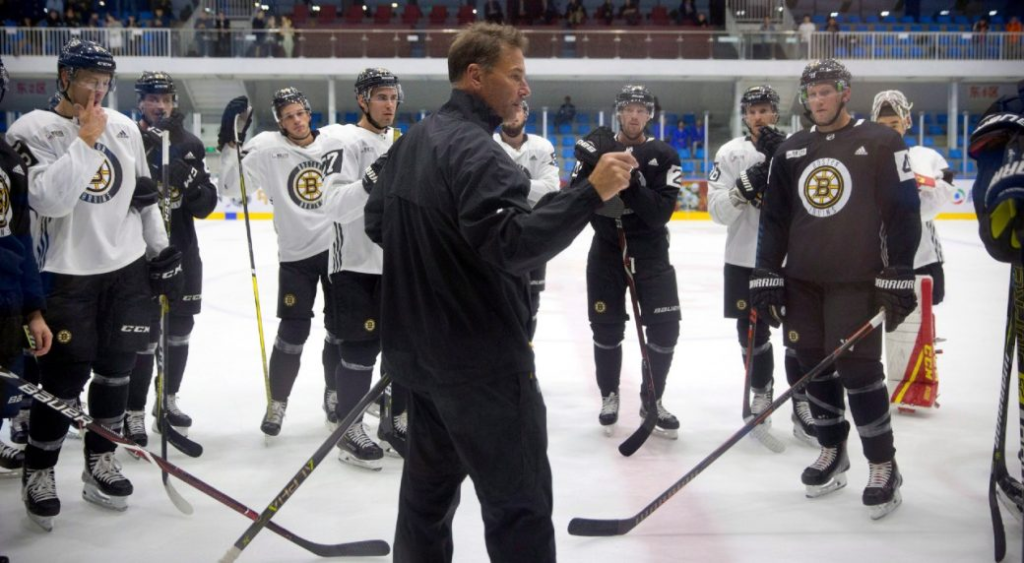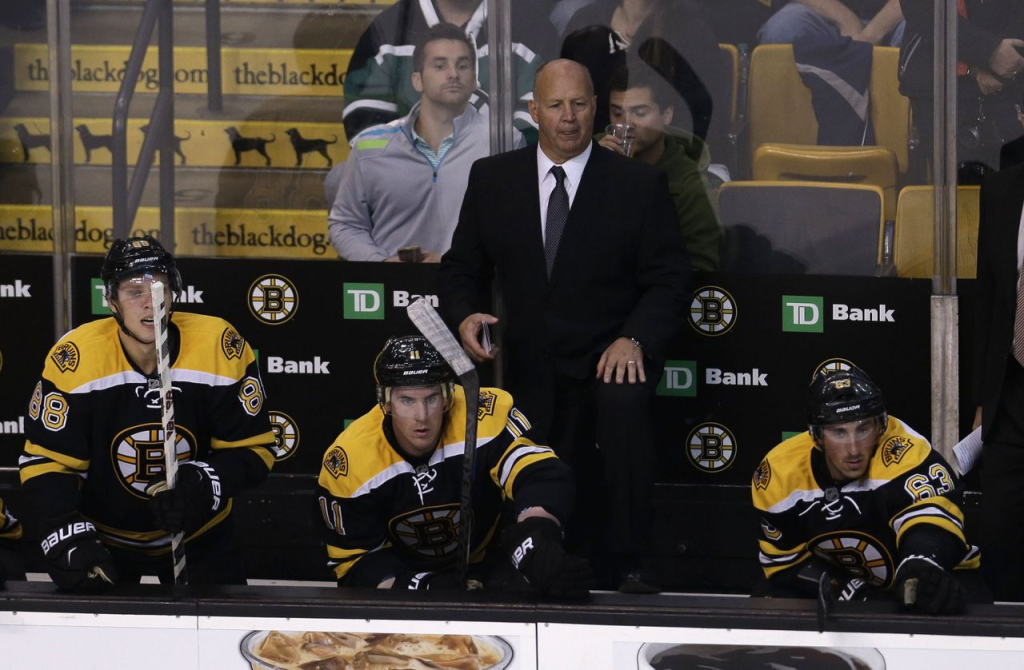
By: Liz Rizzo | Follow me on Twitter @pastagrl88
The Boston Bruins have a long and storied history as being the third-oldest active team in the NHL and the oldest in the United States. Since their formation in 1924, the franchise has had 29 head coaches. While many weren’t always lucky, there are few that enjoyed tremendous success and were even privileged enough to hoist the Stanley Cup alongside their players.
While it’s too early to tell if current head coach Jim Montgomery will ever top the list, here are a few well-known names that top our list of the best head coaches in Bruins’ history, presented in no particular order.
LEADING FROM THE BENCH
5. Harry Sinden

In May of 1966, a young 33-year-old Sinden became the youngest head coach in the league. In his fourth season with the Boston Bruins, Sinden led the 1969-1970 team to their first Stanley Cup title in 29 years.
With the Bruins, Sinden posted a record of 153-116-58 in 327 games in his six years as head coach. Boston would make playoff appearances in five of six seasons with Sinden on the bench.
The player-coach, who was known for his brash personality, moved on to become the team’s general manager for 28 seasons before being promoted to President. He has long since become an integral part of the team’s Stanley Cup championships, multiple Conference titles, and Division championships.
On October 17th, 1995, he became the first general manager in NHL history to record 1,000 victories as the Boston Bruins defeated the St. Louis Blues 7-4. His all-time record as a General Manager stands at 1170-763-301 for a .591 winning percentage.
4. Don “Grapes” Cherry

Aggressive. Flamboyant. Eccentric. There is no other more divisive figure behind the bench in Bruins’ history than 89-year-old Don Cherry. After a three-year stint coaching in the American Hockey League (AHL), he was promoted to the NHL as head coach of the Boston Bruins for the 1974–75 season.
That year, Boston was coming off a successful run of two Stanley Cup wins and three first-place finishes, however after Cherry’s first year as head coach, the team saw the exit of an injured Bobby Orr and Phil Esposito.
Cherry had to reconstruct the team and encouraged a more physical and aggressive playing style. With Esposito and Carol Vadnais being traded to the New York Rangers for Brad Park and Jean Ratelle, the Bruins would have a team that encompassed enforcers and grinders earning the names “lunch-pail gang” or “lunch pail A.C.”
He kept the Bruins on top of the standings and coached a team that boasted an NHL record of 11 players with 20 or more goals during the 1977-78 season. In his five seasons with the B’s, Cherry posted a record of 231-105-63 through 400 regular-season games and led the team to the playoffs every year he coached. Despite leading the team to two appearances in the Stanley Cup Finals, he was never able to achieve the ultimate prize.
3. Bruce “Butch” Cassidy

With the firing of then-head coach Claude Julien, Cassidy served as interim head coach during the 2016-17 season. During that period, the team would end their regular season in third place in the Atlantic Division. Boston made it to the playoffs only to lose to the Ottawa Senators in the first round.
In his first full year as Bruins Head Coach, he led the team to a 50–20–12 regular season record, finishing second in the Atlantic Division. During the first round of the playoffs, Boston would defeat the Toronto Maple Leafs 4–3 to advance to the second round. The B’s would face the Tampa Bay Lightning and lose the series in five games.
During the 2018-2019 season, Cassidy led Boston to the Stanley Cup Finals only to fall to the St. Louis Blues in seven games. In the shortened 2019–20 season, Cassidy coached the team to a 44–14–12 record for 100 points, capturing the President’s Trophy for the third time in franchise history. Unfortunately, the B’s would once again lose to the Tampa Bay Lightning in the second round of the Playoffs.
In his six seasons with Boston, Cassidy recorded a 245-108-46 regular season record. He led the team to six playoff appearances despite not winning the Stanley Cup. Cassidy was named the winner of the 2019–20 Jack Adams Award which is given annually to the best NHL coach.
2. Claude Julien

It took the Boston Bruins 40 years to hoist the Stanley Cup again and they did so in 2011 with Head Coach Claude Julien. As the franchise’s most winningest coach, Julien led the team to seven playoff appearances and post a record of 419-246-94 in 760 games.
In his 10 seasons behind the bench for Boston, the team made the Playoffs in his first seven seasons. He would go on to win the Jack Adams Award as the NHL’s best coach for the 2008-09 season. That same year he coached his 200th win as an NHL head coach when the B’s defeated the Carolina Hurricanes 5-1.
With 33 wins under his belt, Julien’s record would surpass the 31 win-record held by Don Cherry for most Playoff wins by a Bruins head coach. During the 2011-2012 season, Julien reached a few personal milestones as he collected his 200th regular season win with a 6–0 defeat of the Eastern Conference-leading Philadelphia Flyers on October 17th, 2011.
On March 19, 2012, Julien coached his 400th game for the Bruins as the team defeated the Toronto Maple Leafs in an 8-0 victory. The win completed a perfect 6–0 sweep of the season series with the Maple Leafs.
During the 2012-13 lockout season, Julien led his team to their second Stanley Cup Finals in three years. Unfortunately, the team would lose to the Chicago Blackhawks in six games in the Final.
On February 13, 2016, Julien coached his 500th NHL-winning game as the team defeated the Minnesota Wild in a 4–2 road victory. With a 4-2 victory over the Florida Panthers on March 7, 2016, Julien surpassed Art Ross as the winningest coach in team history, winning his 388th game as head coach.
1. Art Ross

In 1924 a crucial meeting between New England businessman and grocery magnate Charles Adams and Art Ross paved the way for the creation of the first and oldest hockey franchise in the United States.
Adams named Ross Vice President, General Manager, Head Coach, and Scout for his newly awarded expansion team and tasked Ross to produce a nickname that would symbolize the speed and agility of an untamed animal. Named after the Old English word for a bear, Ross christened the new team as the Boston Bruins.
With the original colors of brown and yellow (which mimicked the colors of Adam’s grocery chain, First National Stores), Ross would utilize his contacts throughout Canada and the United States to sign players. In their first few years, the Bruins did not fair well against their Canadian counterparts and it wouldn’t be until the 1928-29 season before Boston would win their first Stanley Cup.
Many factors including some nifty business moves by Ross led the team to their first victory in the newly opened Boston Garden. In 1926 the Western Hockey League, the other top professional hockey league, was in decline forcing the owners to sell the remaining teams for $300,000.
Ross convinced Adams to pay the money and as a result, the Bruins acquired the rights to several players, the most notable being Future Hall of Famer Eddie Shore. Goaltender Cecil “Tiny” Thompson was also signed in 1928. Ralph “Cooney” Weiland was also brought over from Minnesota. Ross also acquired Cy Denneny from Ottawa and made him a player-assistant-coach while he assumed the role of coach and team manager.
With Ross on the bench for the Bruins, Boston had 10 first-place finishes in the league, 12 playoff berths, and five Stanley Cup Final appearances that included victories in 1929 and 1939. He accumulated a record of 387-290-95 in 772 games in his 17 seasons as head coach.
Ross became the first coach to ever take out a goaltender for an extra attacker. He was also responsible for the signings of Milt Schmidt, Bobby Bauer, and Woody Dumart, who were dubbed the “Kraut Line.” He had also acquired new goaltender Frank Brimsek in 1938. The Bruins would finish first in the league that same year.
Ross leaves a legacy that not only included the naming and developing of the NHL’s first expansion team in the United States, but he also helped improve aspects of the game itself. Ross would develop a new style of goal net that was used up until 1984 when a modified version was adopted. He also improved the design of the puck which would include beveled edges that prevented it from bouncing too much. The puck composition also changed from natural rubber to used synthetic rubber.
Alongside New York Rangers Coach Frank Boucher, Ross helped to create the red line, which was introduced to help speed up the game by removing the ability for defenders to pass the puck from the defensive to the offensive zone. Up until 2006, it was against the rules of hockey to make a two-line pass. In order to help tell the red line and blue lines apart on television, Ross suggested that the red line be striped.
In 1949, Ross was inducted into the Hockey Hall of Fame, and in 1975 he was inducted into the Canadian Sports Hall of Fame. He would donate the Art Ross Trophy in 1947 to be awarded to the league’s leading scorer during the regular season. In 1984 he was posthumously awarded the Lester Patrick Trophy for service to hockey in the United States.



Leave a Reply